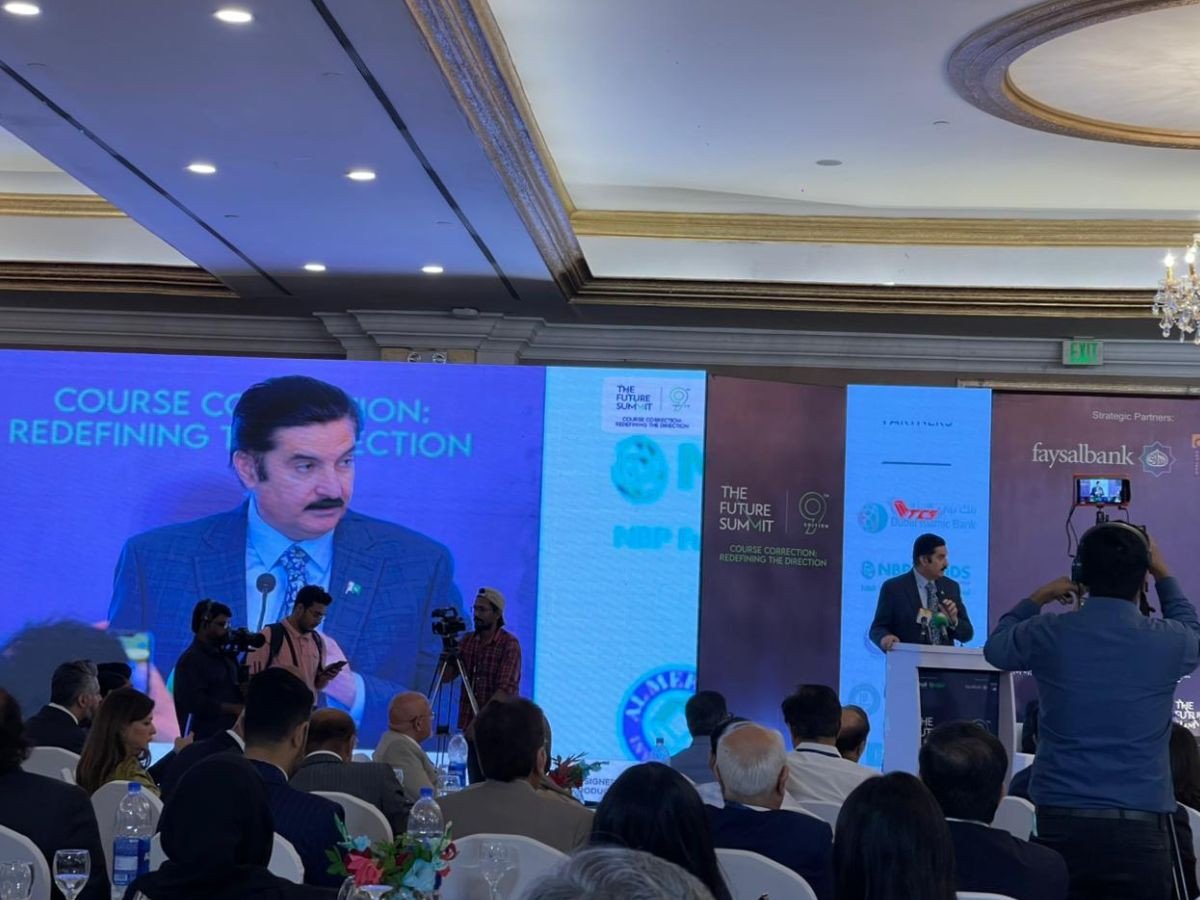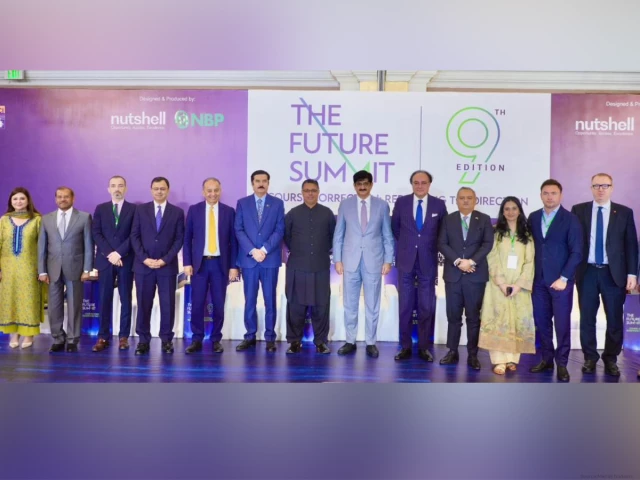Aurangzeb warns unchecked population growth, climate change pose ‘existential threats’ to Pakistan
Finance Minister Muhammad Aurangzeb announced that Pakistan has reached a staff-level agreement with the International Monetary Fund (IMF) for its second loan review, with the board expected to approve the next tranche in early December.
Speaking at The Future Summit 2025, themed “Course Correction: Redefining the Direction,” in Karachi, Aurangzeb said the government is steering the economy toward an investment-driven model led by the private sector, rather than one dependent on borrowing. He warned that Pakistan’s economic stability faces two of its greatest challenges, unchecked population growth and climate change, calling them “existential threats” that demand immediate and sustained policy action.
He spoke about his recent visits to Washington, where he met with officials from the World Bank and the IMF. He appreciated recent diplomatic efforts with Saudi Arabia, the United States, and other partners, describing them as steps toward stronger bilateral and economic cooperation.
He underlined that geopolitical shifts were reshaping the global economy. “The role of the private sector and productivity-led growth is vital for building resilience in the world economy,” he noted. He said investor confidence was improving, adding, “Our direction is right.”
Aurangzeb said fiscal reforms had advanced steadily over the past 18 months, with new measures under way to expand the tax base using artificial intelligence to strengthen revenue collection. “Our sugar sector is now digitised, and the cigarette sector will follow,” he said, adding that 900,000 new taxpayers had been registered. The policies will expand to other sectors as well.
The finance minister confirmed that Google had decided to open an office in Pakistan and was also considering the country as an export hub, reflecting growing global confidence in Pakistan’s tech ecosystem.
Aurangzeb said a blockchain centre had been established at the Lahore University of Management Sciences (LUMS) through a USD 13 million private investment, as part of the government’s broader push toward emerging technologies and digital infrastructure for AI-led growth.
He also mentioned that Egypt had shown interest in adopting Pakistan’s reform model, while the privatisation of Pakistan International Airlines (PIA) remained on track for completion by the end of the year. A recent UAE investment in a Pakistani bank, he said, marked “the beginning of a new era.”
‘Death of hope is the worst thing’
At the same summit, Federal Minister for Climate Change and Environmental Coordination Senator Musadik Malik spoke about the need for a “level playing field” in Pakistan’s economy. “The death of hope is the worst thing, and hope can only thrive in a competitive environment,” he said, adding, “Education, values and equal opportunities are the only drivers.”
Malik warned that elite dominance and protectionist policies, such as subsidies for some select local sectors, are suffocating innovation, exports and foreign investment. He said Pakistan cannot sustain itself if certain industries continue to benefit at the expense of others.
“If one sector gains advantage through subsidies and extraction, how can we ever be competitive?” he asked. “When your factor inputs earn 200 or 400 profit on each product, why would anyone move downstream to value addition? They will always go where the returns are 300 per cent.,” he added.
He further explained that Pakistan’s “boom-and-bust cycle” stems from this imbalance. “The dollar comes in, and we earn in rupees. Even if you fill sacks with rupees, it doesn’t matter, because you can’t compete against the dollar,” he said, describing how currency disparity and structural inefficiency keep the economy trapped in recurring crises.
Read: Floods vs Economy: WB warns Pakistan’s FY26 growth at risk
Malik stressed that productivity and innovation can only emerge through equal competition, adding, “A level playing field is a must — without it, a competitive market is not possible. Elite capture destroys healthy competition.”
He lamented that no foreign investment had entered export-based sectors in the past two decades, urging reforms to break the stagnation. “The aspirations of our youth are simple,” Malik said. “They want good jobs, safe neighbourhoods and basic services.” He added that macroeconomic figures like GDP growth mean little to the average Pakistani, who is more concerned about education, healthcare, pollution and urban flooding.
Malik warned that environmental challenges — from smog in Lahore to flooding in Karachi — were reducing life expectancy by up to eight years. “Butterflies and fireflies are gone; everything is ruined,” he said, calling for immediate reforms in local governance and urging that local bodies must be empowered to build strong, healthy communities.
The minister stated that innovation requires competition and that protectionist policies and preferential access to energy for certain sectors hinder exports and foreign investment. “If the elite dominates society, how will businesses grow?” he asked, urging an end to privilege-based policymaking.
Sindh Chief Minister @MuradAliShahPPP addresses The Future Summit 2025 – “Course Correction: Redefining the Direction”, organised by the Nutshell Group and the National Bank of Pakistan, highlighting the province’s commitment to innovation and sustainable growth. pic.twitter.com/7fJFysRELv
— Bakhtawar Malik (@BakhtawarM123) November 5, 2025
The Chief Guest, Sindh Chief Minister Syed Murad Ali Shah, emphasised that the future belongs to those who adapt the fastest. We must redefine direction towards innovation and sustainable growth,” he said. “The public sector will provide the infrastructure to enable the private sector to innovate and grow.”
He added that the province contributes over 30 per cent to Pakistan’s GDP, with Karachi alone accounting for nearly half of the country’s exports. He highlighted reforms in transparency, digital governance, and ease of doing business, calling Sindh’s public-private partnership model the strongest in Pakistan.
Shah also said Rs959 billion had been allocated for current development projects and Rs3.45 trillion proposed for the next budget, including a record Rs523.7 billion for education. With 60 per cent of the population under 30, he said Sindh is prioritising digital and vocational training to empower youth and drive sustainable growth.

Also speaking at the event, Khyber-Pakhtunkhwa Governor Faisal Karim Kundi called on investors to explore opportunities in the province, citing its vast potential in tourism, minerals, renewable energy, and value-added industries such as marble, honey, and carpet manufacturing.
He said K-P’s rich natural resources, strategic location, and improving infrastructure make it an attractive destination for both local and foreign investment. He emphasised that the government aims to create a transparent and business-friendly environment that fosters sustainable growth through strong public-private partnerships.
Women’s inclusion in finance
Adding a critical perspective on inclusion, Fauzia Janjua, a finance and management consultant with more than 18 years of experience, drew attention to the absence of women in leadership roles. “Not a single woman was sitting on the bench during the opening session, a stark reminder of how far we still have to go,” she said.
She emphasised that real progress would remain out of reach until women became part of the mainstream economic process. “Women are an integral part of any direction and course correction,” she said, stressing that financial inclusion and women’s empowerment must go hand in hand.
Quoting Napoleon, she added, “Give me good mothers, and I will give you a good nation,” underscoring the generational value of work–life balance and the need to build fair, inclusive spaces for women in finance.
Also Read: ‘Data and AI’ key to economic future
Another key part of the discussion focused on how Pakistan can leverage data to strengthen its economy. The concept of sovereign intelligence—owning and using local data effectively—lies at the heart of this transformation. Pakistan’s goal should not be isolation but rather the empowered use of data to drive business innovation, inform policymaking, and enhance economic independence. The bigger picture is clear — countries that will thrive are those that align robust policy frameworks with technology-driven growth.
The first day of The Future Summit 2025 ended with a shared resolve to set Pakistan’s “course correction” in motion through action, not rhetoric. The call to “Don’t watch the clock; see what it does — keep going” captured the spirit of perseverance needed for meaningful reform. Speakers stressed that real progress will come when policies translate into delivery, institutions work in sync, and the private sector and youth are empowered to drive change, without neglecting that artificial intelligence has become the “new normal” shaping economic and digital transformation.

